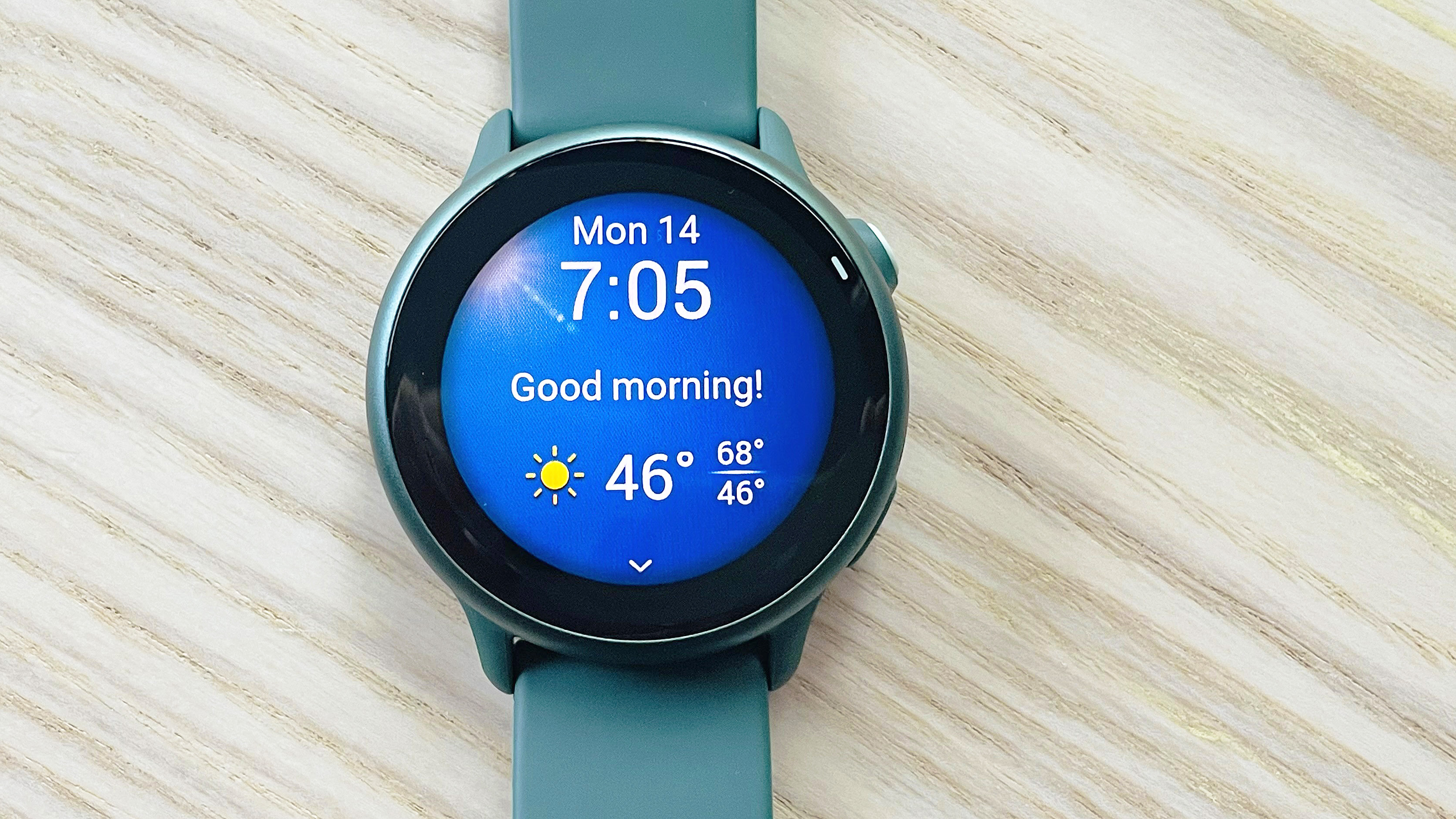Samsung Galaxy S21 Plus vs. iPhone 12 Pro: Which phone is best?
This Galaxy S21 Plus vs. iPhone 12 Pro face-off will help you choose the right phone
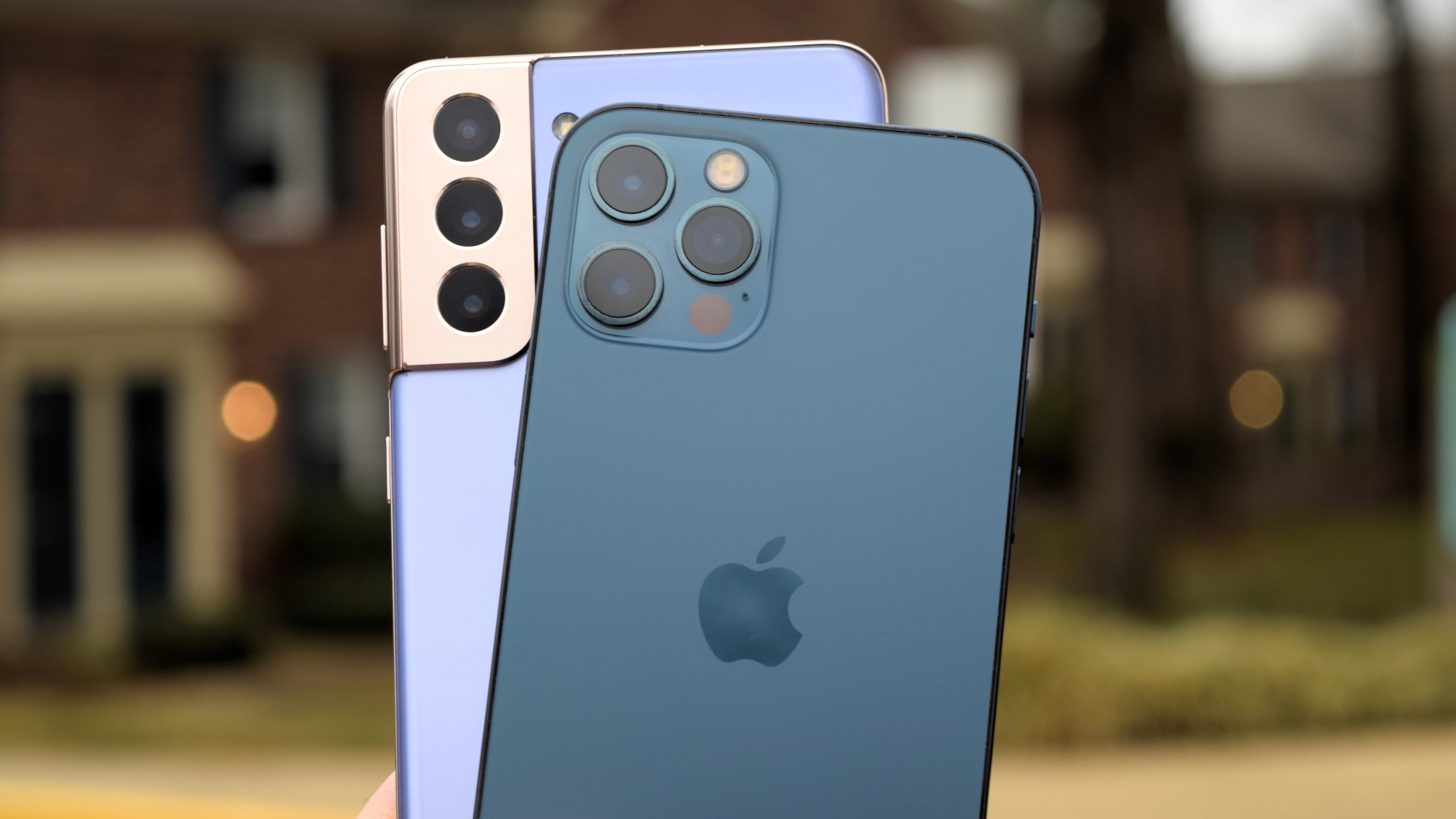
The Galaxy S21 Plus does a lot of things right, from a big, beautiful display to excellent performance. However, so does its direct competitor, the iPhone 12 Pro. Which one ends up being better for you depends on what you want from a phone, and whether Android or iOS is more your style.
The truth is, both phones are incredible devices. They cost $999 and are drastically different in size. The Galaxy S21 Plus is a big phone, while the iPhone 12 Pro is more compact. And although the larger, more robust Galaxy S21 Ultra exists, it competes with the iPhone 12 Pro Max rather than the smaller 12 Pro.
- Galaxy S21 vs. iPhone 12: Which phone wins?
- iOS 15: Everything we know so far
- Plus: iOS 14.5 just stole Waze’s best features for Apple Maps
How does Samsung's latest stack up against Apple's best? It’s a pretty close fight. Our Galaxy S21 Plus vs. iPhone 12 Pro face-off will shed some light on how these phones compare.
Samsung Galaxy S21 Plus vs. iPhone 12 Pro: Specs
| Row 0 - Cell 0 | Galaxy S21 Plus | iPhone 12 Pro |
| Starting price | $999 | $999 |
| Screen size | 6.7-inch AMOLED (2400x1080) | 6.1-inch OLED (2532x1170) |
| Refresh rate | 48Hz - 120Hz | 60Hz |
| CPU | Snapdragon 888 | A14 Bionic |
| RAM | 8GB | 6GB |
| Storage | 128GB, 256GB | 128GB, 256GB, 512GB |
| microSD | No | No |
| Rear cameras | 12MP wide (f/1.8), 12MP ultra-wide (f/2.2), 64MP telephoto (f/2.0) with 3x hybrid zoom/30x digital | 12MP wide (f/1.6), 12MP ultra-wide (f/2.4), 12MP telephoto (f/2.0) with 2x optical zoom/10x digital |
| Front camera | 10MP (f/2.2) | 12MP TrueDepth (f/2.2) |
| Water resistance | IP68 up to 1.5 m | IP68 up to 6 m |
| Battery size | 4,800 mAh | 2,815 mAh |
| Battery life | 9:41 (adaptive) / 9:53 (60Hz) | 9:06 |
| Size | 6.36 x 2.98 x 0.31 inches | 5.78 x 2.82 x 0.29 inches |
| Weight | 7.05 ounces | 6.66 ounces |
Samsung Galaxy S21 Plus vs. iPhone 12 Pro: Price
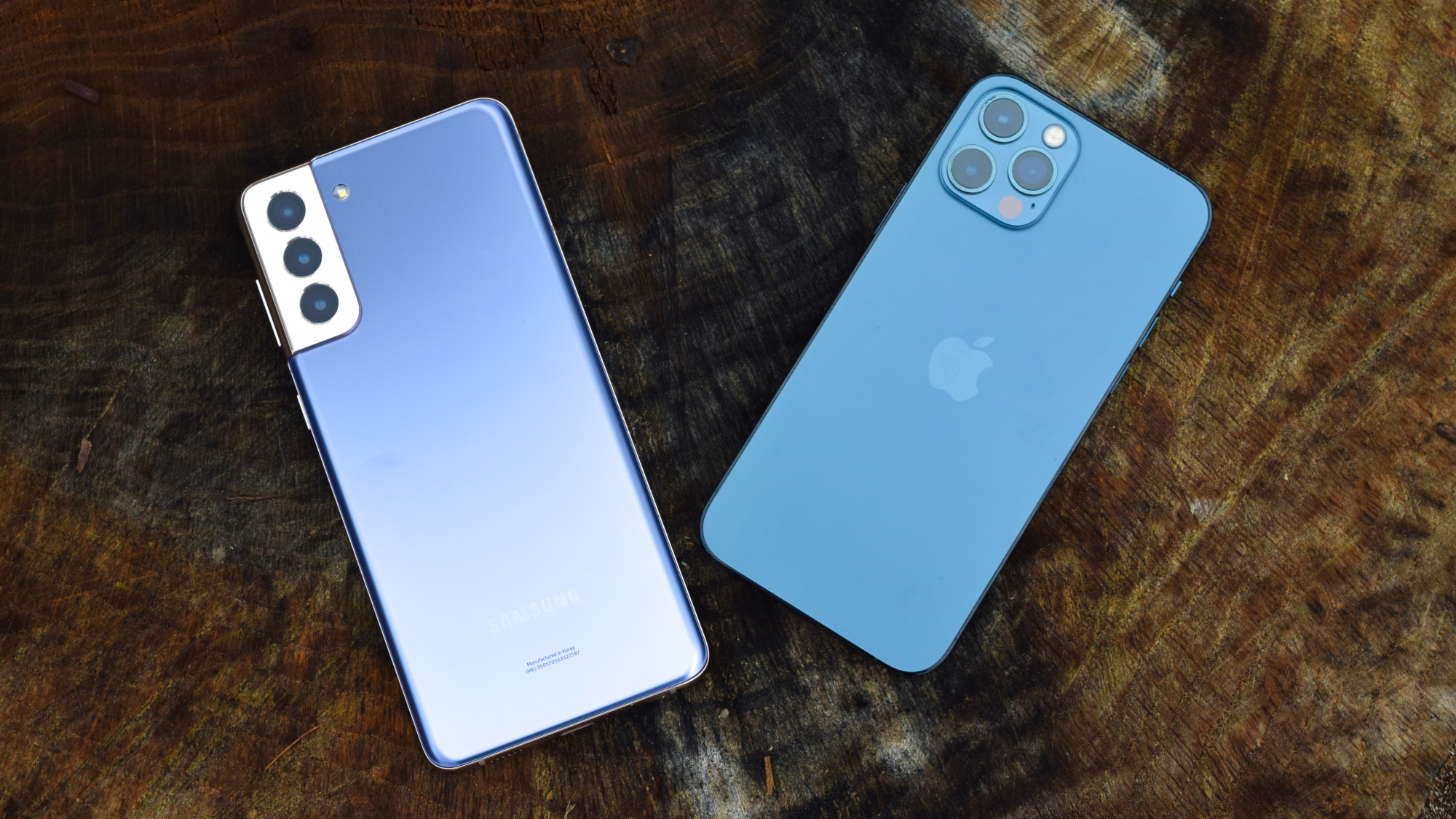
Samsung seems to have learned a lesson from the overpriced Galaxy S20 series, because all three S21 devices are $200 cheaper. You can pick up a Galaxy S21 Plus starting at $999 for the 128GB model from Samsung or your carrier. For another $50, you can double the storage to 256GB. Be sure to check out our best Galaxy S21 deals first.
Apple launched the iPhone 12 series in October, with the iPhone 12 Pro starting at $999 for the base 128GB model. You can jump to 256GB for another $100, or load up to 512GB for a total of $1,299. We’ve rounded up the best iPhone 12 deals for you, so drop by to make sure you’re getting the best price.
The Galaxy S21 Plus comes in either 128GB or 256GB of storage, while the iPhone 12 Pro is available in 128GB, 256GB, and 512GB. It’s nice that both handsets start at 128GB of storage for their base variants, as that’s a lot of storage for most people. But storage junkies will likely want the 512GB option, especially since the Galaxy S21 Plus lacks a microSD card slot.
Winner: Draw
Samsung Galaxy S21 Plus vs. iPhone 12 Pro: Design
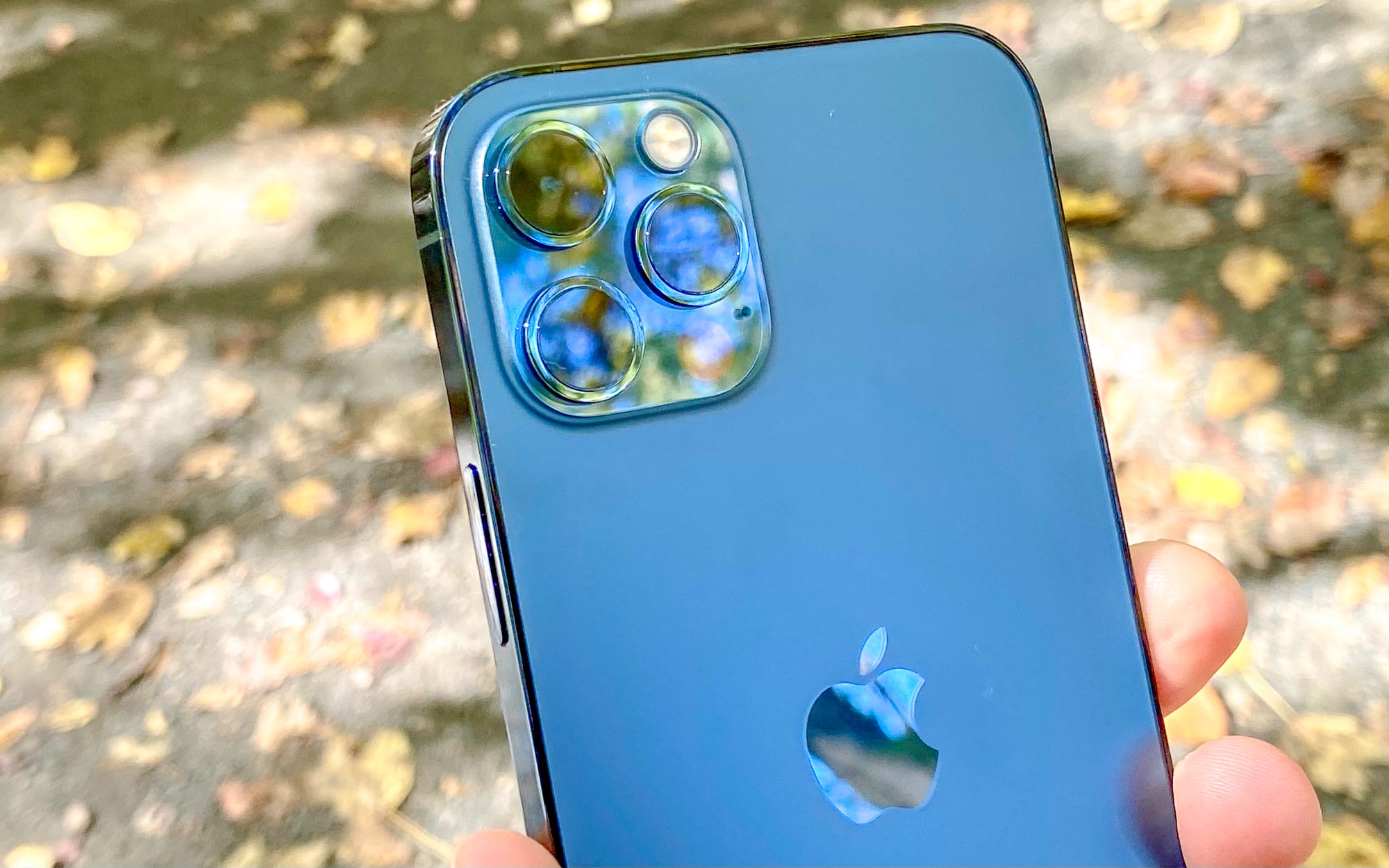
Both the Galaxy S21 Plus and iPhone 12 Pro are marvels of engineering, packing in powerful hardware into beautiful bodies. They each have a glass back, though the S21 Plus’ has a matte finish on it that feels a lot like the polycarbonate Galaxy S21. The soft touch coating on the blue iPhone 12 Pro feels great and grippy. I have no fears about dropping this phone, thanks in part to its diminutive size.
The Galaxy S21 Plus houses its triple camera module into a contour that blends seamlessly with the phone’s frame. Meanwhile, the iPhone 12 Pro looks very similar to the 11 Pro, but Apple did away with the curved edges. Instead, the 12 Pro’s frame is very squared off, which isn’t as comfortable or ergonomic to hold.
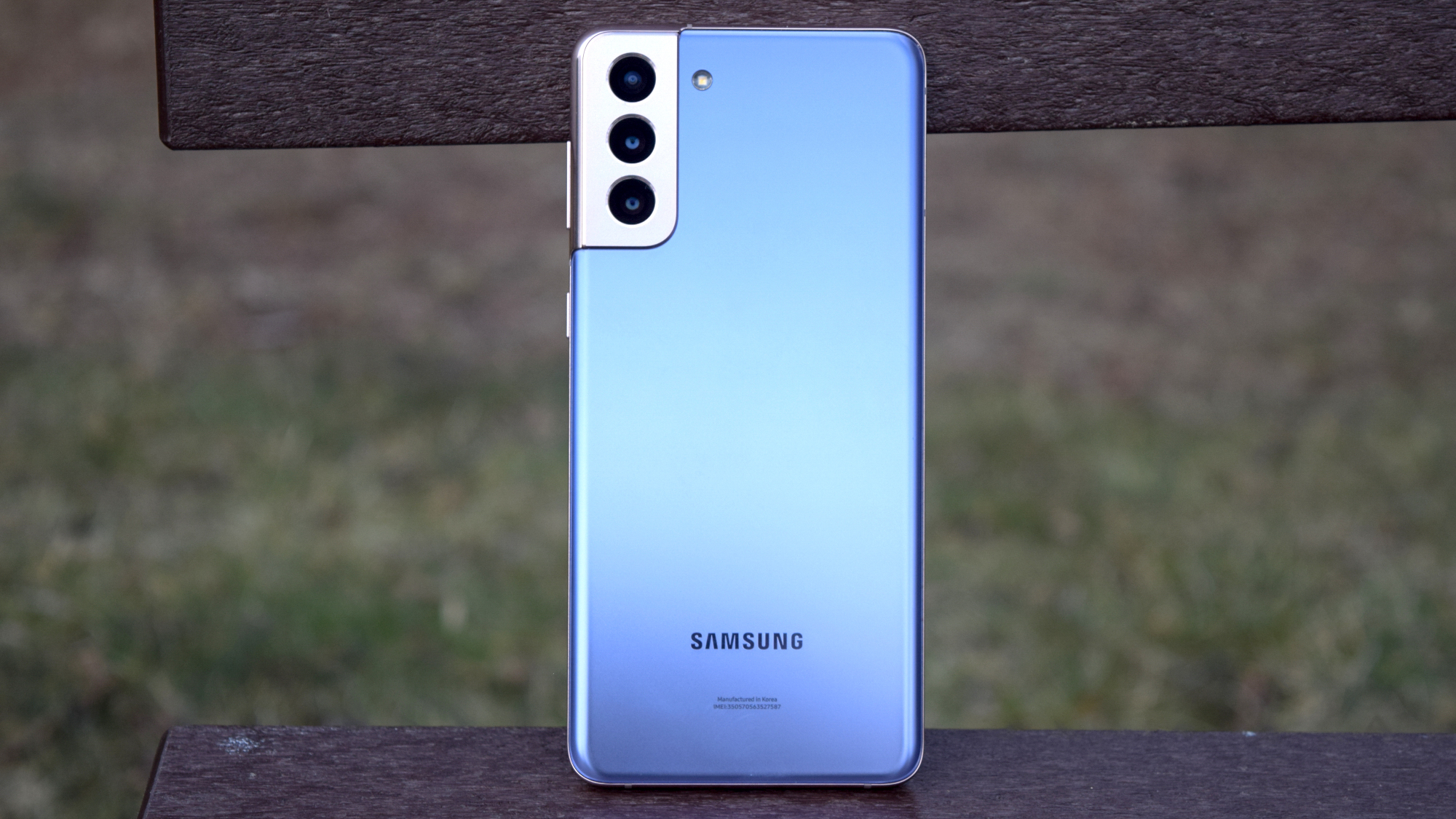
As you might expect, the Galaxy S21 Plus is the larger phone, coming in at 6.36 x 2.98 x 0.31 inches and 7.05 ounces. The iPhone 12 Pro is a much smaller 5.78 x 2.82 x 0.29 inches and 6.66 ounces. Both phones feature an IP68 water- and dust-resistance rating, but the iPhone can survive for 30 minutes at a deeper depth (6 m) versus the S21 Plus (1.5 m).
The Galaxy S21 Plus comes in Phantom Violet, Phantom Black, and Phantom Silver. Phantom Gold and Phantom Red are also available as Samsung.com exclusives. The iPhone 12 Pro is available in Graphite, Silver, Gold, and Pacific Blue.
Despite them both being excellently-design phones, we have to give the advantage to the iPhone 12 Pro for its better water resistance rating.
Winner: iPhone 12 Pro
Samsung Galaxy S21 Plus vs. iPhone 12 Pro: Display
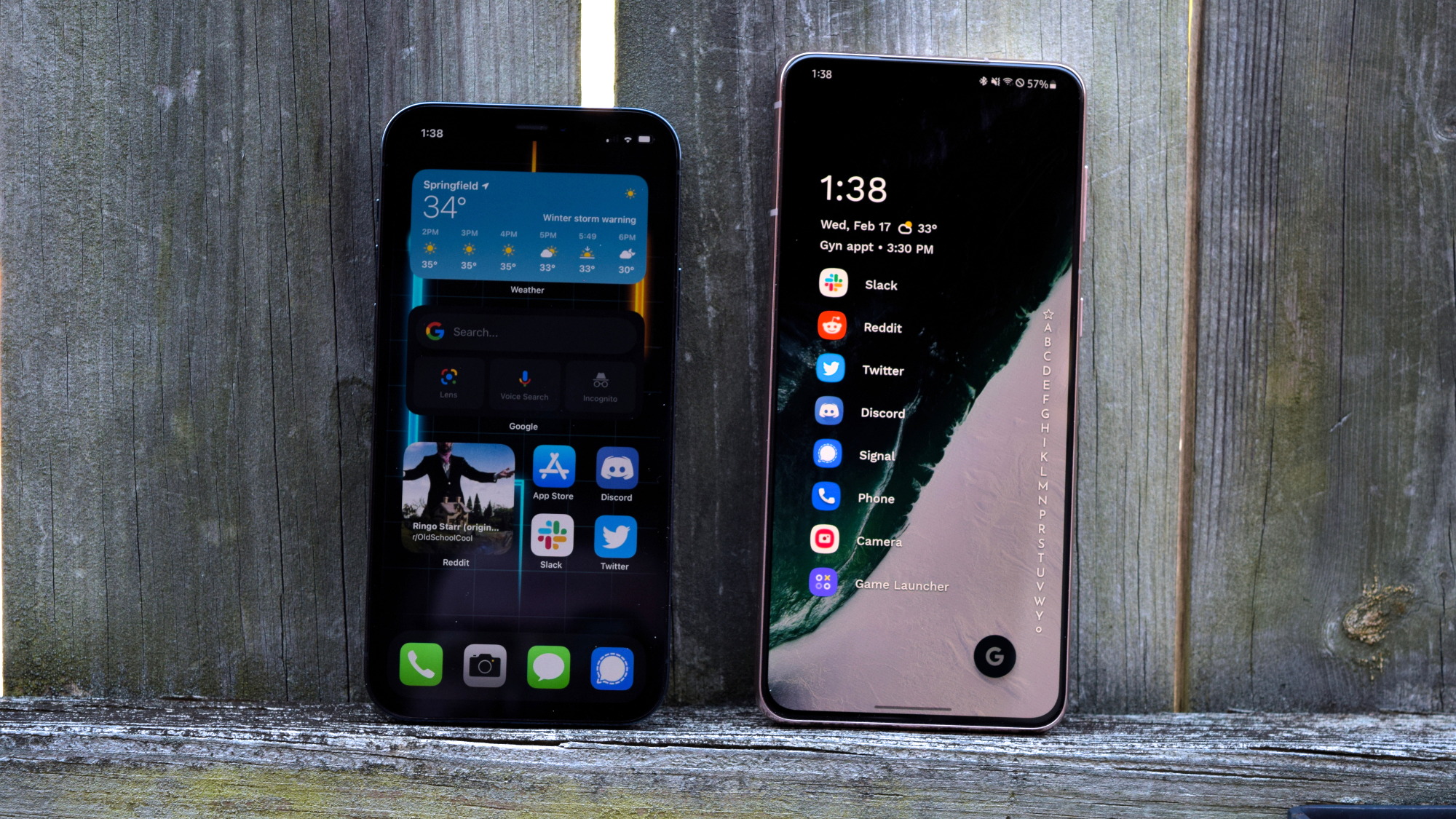
The Galaxy S21 Plus and iPhone 12 Pro both use OLED displays, and you’d be hard-pressed to tell them apart in most use cases. The S21 Plus has a 6.7-inch 2400 x 1080 Dynamic AMOLED screen with a variable 48Hz - 120Hz refresh rate. This means that the screen refreshes faster, which leads to a higher frame rate in the operating system. That equals smoother scrolling and higher frame rates in games that support high refresh rate displays.
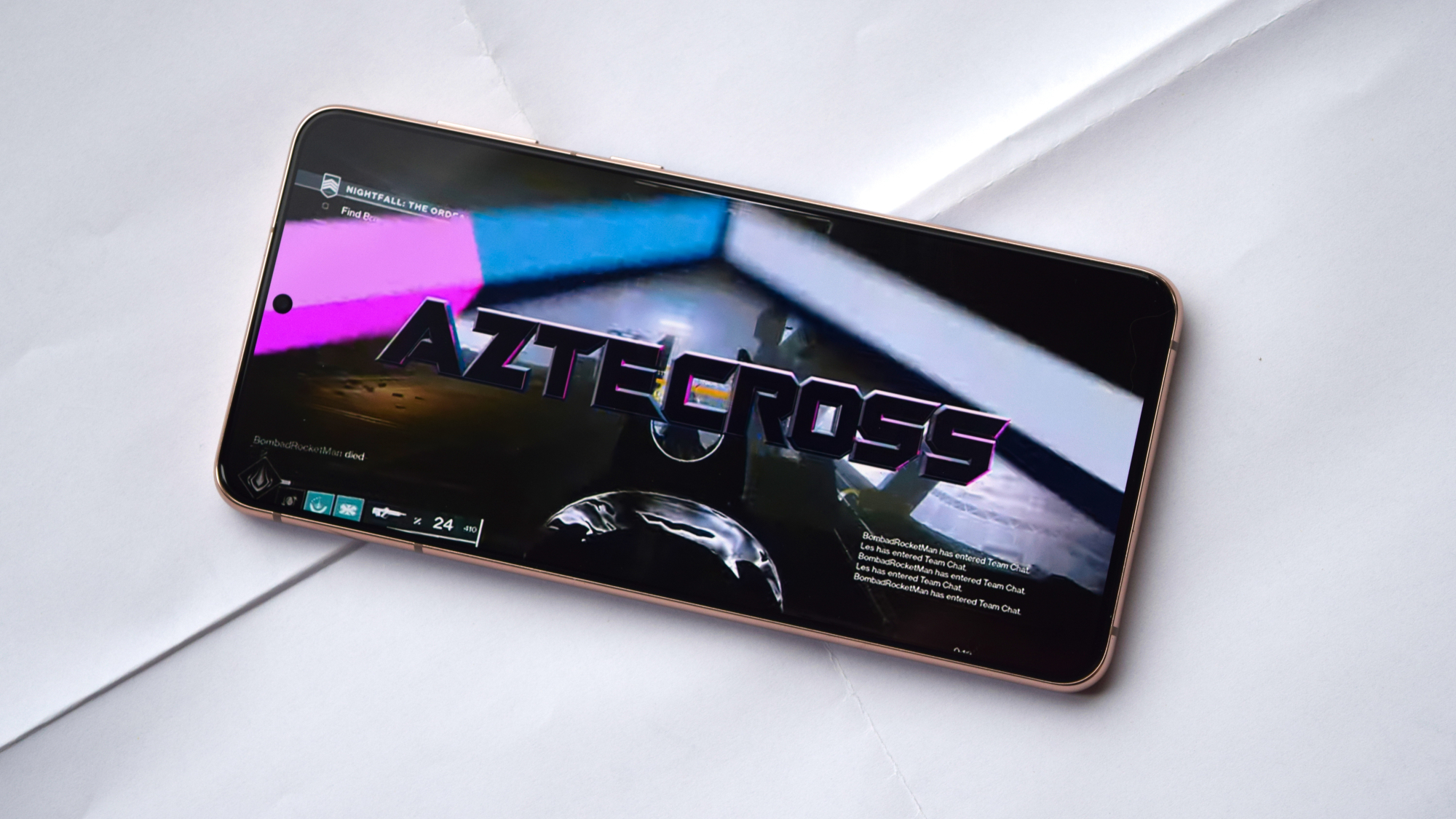
The iPhone 12 Pro uses a 6.1-inch 2532 x 1170 Super Retina XDR OLED display, though it’s locked to 60Hz. Thankfully, iOS already looks really smooth with scrolling and animations, but it’s not quite the same as Android at up to 120 frames per second. However, the 12 Pro’s display is quite incredible and beautiful to look at.
As with all phones, we put these two through some lab tests to get a better idea about their color accuracy and reproduction. For the Galaxy S21 Plus, in the Natural mode, it managed to reproduce 103.8% of the sRGB space and 73.% of the DCI-P3 gamut. The S21 Plus registered a Delta-E color accuracy score (where 0 is perfect), of 0.18.
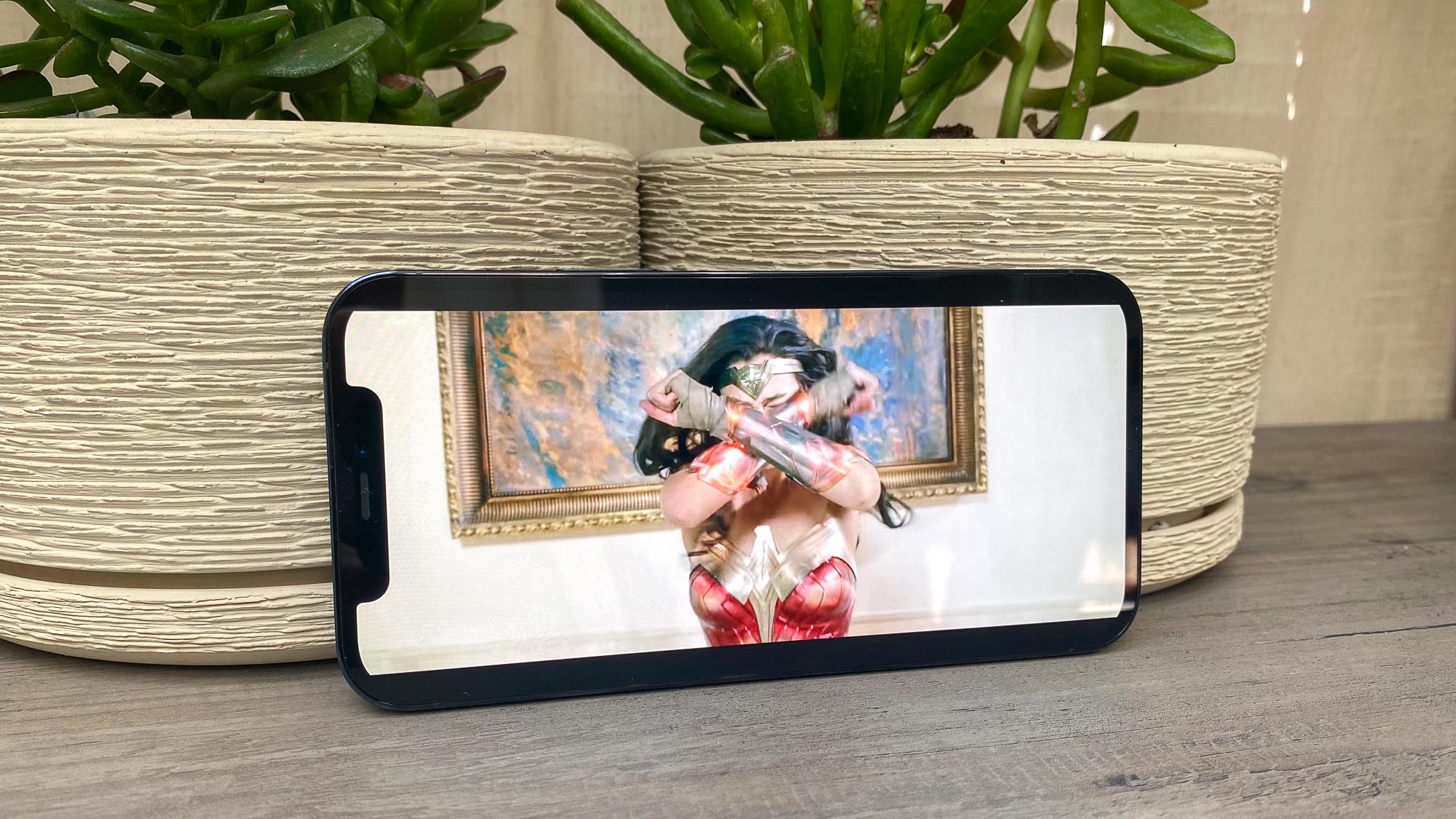
The iPhone 12 Pro managed 115.6% of the sRGB gamut and 81.9% of DCI-P3. Its Delta-E score was 0.28, a far cry from the Galaxy S21 Plus’. Both phones, however, get plenty bright, with the S21 Plus managing 747 nits and the 12 Pro getting 743 nits.
Both displays are excellent by any means of measurement, casual or technical. However, we can only crown one winner in this category and we have to give it to the Galaxy S21 Plus with its higher refresh rate.
Winner: Galaxy S21 Plus
Samsung Galaxy S21 Plus vs. iPhone 12 Pro: Cameras
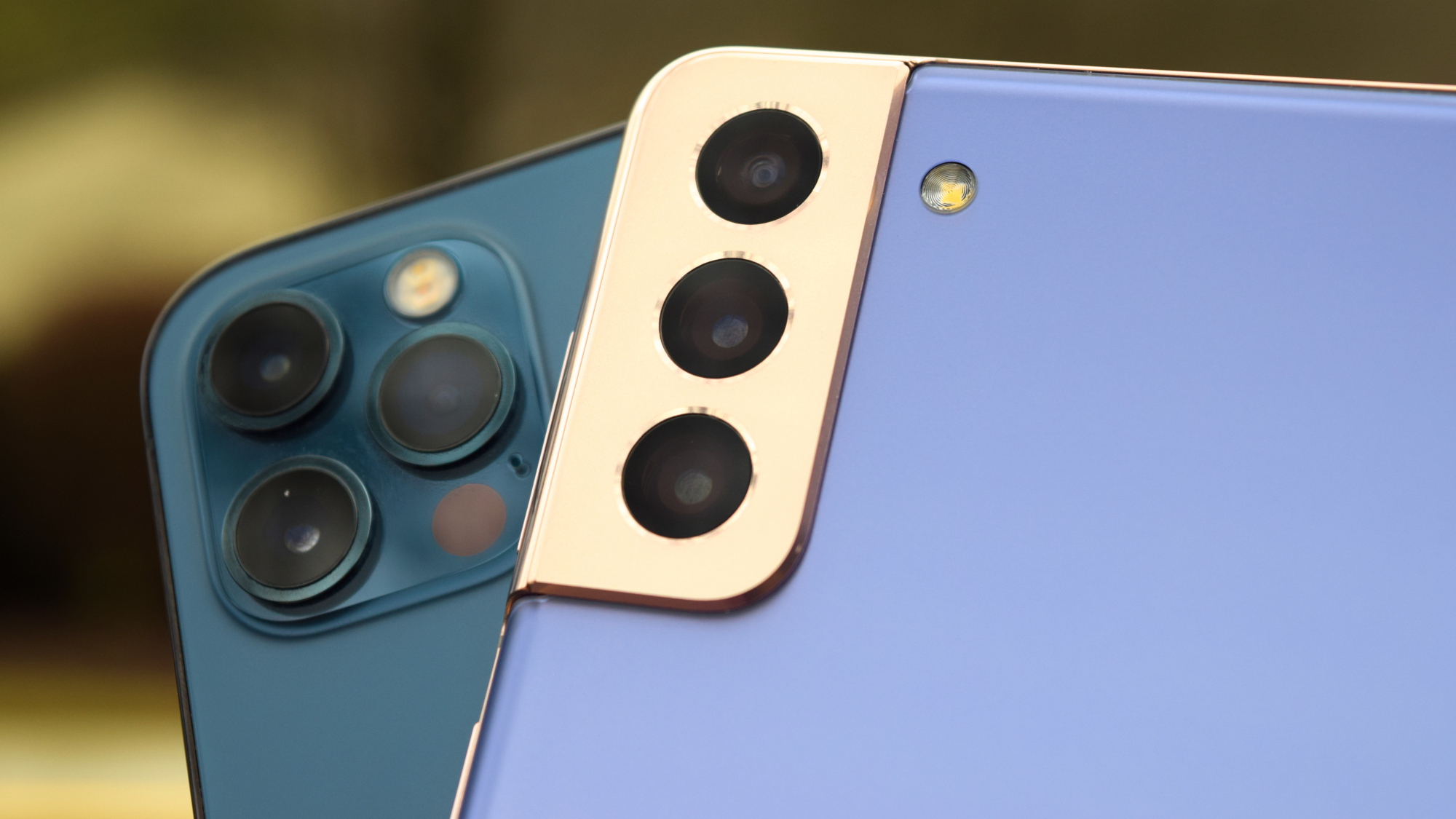
Both phones use triple camera lens setups, and they’re remarkably similar. The Galaxy S21 Plus has a 12MP main wide-angle shooter, with a 12MP ultrawide and a 64MP 3x telephoto. The iPhone 12 Pro also uses a 12MP wide-angle and a 12MP ultrawide, but its telephoto lens is backed by a 12MP sensor.
In practice, the S21 Plus and iPhone 12 Pro each produce fantastic images, though they each take different approaches to post-processing. Samsung strays toward brighter scenes and smoother faces, while the iPhone remains a bit more true to life (similar to the Pixels). The magic for both devices lies in software.
The iPhone 12 Pro with the A14 Bionic sports Apple’s best computational photography efforts. It also has the best version of Night Mode, solid zoom performance, and excellent post-processing. The Galaxy S21 Plus comes packed with Samsung’s latest features like the crazy Space Zoom, zoom lock, Director’s View and a bunch more. Here’s how these two phones compare.
In this photo of the association pool near my house, you can see differences right off the bat. The S21 Plus oversaturated the image, making the tall trees in the background and the bush in the foreground more verdant. You can also see how much brighter everything is, because that same bush to the left is far more visible than in the iPhone’s shot.
But I prefer the iPhone’s image here, because the shadow in the foreground is deeper, the umbrella is a darker green, and the picture doesn’t have the weird soft-brushed effect that the S21 Plus’ does.
In this outdoor photo, you can see a similar pattern. The Galaxy S21 Plus bumps up the exposure, making the sky a bright blue, and softening the whole image. It looks a bit surreal to me. The iPhone 12 Pro reproduces the scene better. The shadows are deeper, there’s a truer sense of depth, and the picture as a whole looks more drab since it’s winter. I have to give it to the iPhone here.
Moving inside, I challenged each phone to take a decent photo of my RGB keyboard. The colors radiate from the center hypnotically. Starting with the S21 Plus, the phone’s tendency to bump up the exposure works against it here. The keyboard looks a bit blown out and blurry. The white keycaps are hard to read. With the iPhone’s shot, the colors look a bit richer, the exposure is kept in check, and the keycap legends are more legible.
The important thing with these portrait shots is how these phones approached the image of me back up against the front of my house. The S21 Plus’ shot is very cool, overly smoothed, and it feels a bit weird to me. But the iPhone’s portrait isn’t much better. As the sun sets, the 12 Pro warmed everything up. My face is generally very ruddy, but the iPhone exaggerates this to a small degree.
On the other hand, the redness in my beard is more appropriate and true-to-life. It’s hard to call a winner here so both phones struggled to capture my likeness appropriately. They both applied a similar blur radius on the background for that bokeh effect. This one is a draw.
In this selfie comparison, I’m honestly at a loss on which one I like better. On one hand, the Galaxy S21 Plus’ photo is softer and it regulates the harsh sunlight in the background better. You can still make out details in my face and the stray strands of hair that escaped my pony tail. But on the other hand, the iPhone’s selfie has much sharper details, even if the background is on the verge of blowing out. The fibers of my hoodie look a bit clearer, too. I’m going to call it a draw on this test, because I could honestly pick either image and be happy.
Trying out the different night modes, the results look a bit familiar. This number plate is very clear in both images, but the iPhone’s shot is brighter. You can make out a lot more detail in the bricks and light fixture, and the light from the window is softer and warmer, almost inviting. While the Galaxy S21 Plus does a good job, the iPhone 12 Pro does way better in this night mode comparison.
Finally, I put both phones to their max zooms to see if they could make out the pink stool at the end of the road. Both photos are incredibly blurry and neither is remotely usable in any context I can think of, but you can see how much closer the Galaxy S21 Plus’ 30x zoom got versus the 10x on the iPhone 12 Pro. It’s no contest.
Winner: iPhone 12 Pro
Samsung Galaxy S21 Plus vs. iPhone 12 Pro: Performance
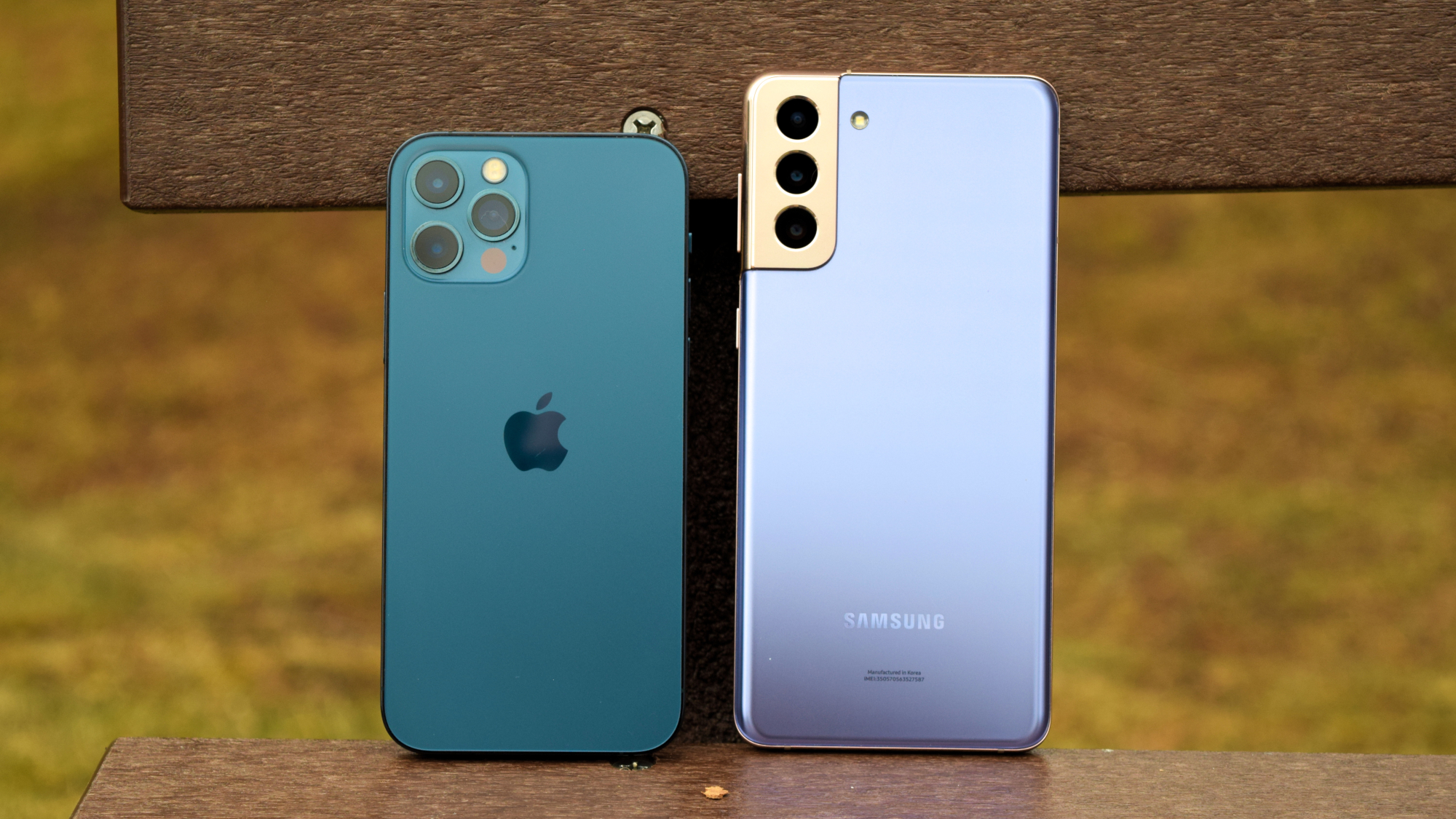
When it comes down to it, the iPhone 12 Pro is the ultimate smartphone in terms of performance. Despite the Galaxy S21 Plus rocking a Snapdragon 888, Qualcomm’s best system-on-chip yet, the iPhone 12 Pro’s A14 Bionic continues to lead in raw numbers. That’s only part of the story, though, and in terms of real-life use, both phones feel pretty equal in most respects.
Gaming, for example, feels excellent on either device. Whether it was some Call of Duty: Mobile, Genshin Impact, or streaming PC games via Steam Link, the S21 Plus and 12 Pro both worked exceptionally well. Beyond just gaming, these phones easily handled web browsing, running multiple apps simultaneously, and watching videos on YouTube, Plex and Crunchyroll.
In our lab tests, both handsets go through the same benchmarks so that we can get an idea of how they perform. In Geekbench 5, the Galaxy S21 Plus scored 3,300 for multi-core, while the iPhone 12 Pro got 3,669.
As far as graphics performance, for 3DMark’s Wild Life Unlimited, the S21 Plus averaged 33.37 fps. The 12 Pro averaged 51 fps. And when transcoding a 4K video to 1080p in Adobe Premiere Rush, the S21 Plus completed the task in one minute. The iPhone 12 Pro did it in just 27 seconds.
Winner: iPhone 12 Pro
Samsung Galaxy S21 Plus vs. iPhone 12 Pro: 5G
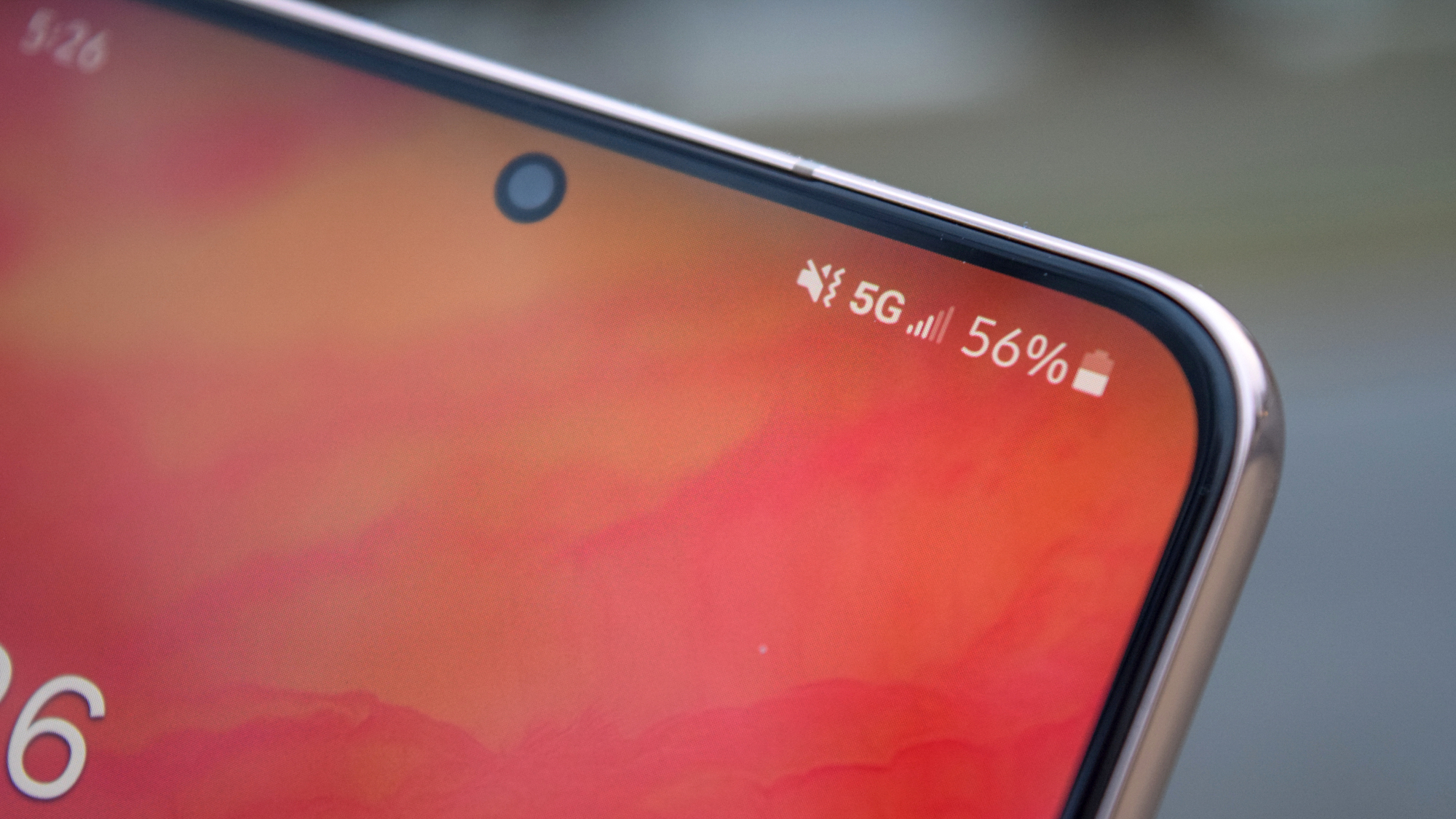
Like with the Galaxy S21 vs. iPhone 12 face-off, we didn’t get a chance to put both the Galaxy S21 Plus and iPhone 12 Pro through a full suite of 5G testing. Instead, we used a Verizon SIM and a low-band area (mmWave isn’t easily accessible right now).
Both phones reported a full signal, sitting in the same spot in the same hand for our testing. We performed 5 dry runs and 5 recorded tests with the Speedtest app and averaged the results together. Considering how iPhone 12 Pro Max fared against the Galaxy S21 Ultra in that face-off, these results surprised us.
The Galaxy S21 Plus’ average download speed was a mere 4.3 Mbps, and the iPhone 12 Pro’s was 12 Mbps. It’s another laughable example of the state of 5G right now, especially the low band Verizon rollout (I live in the greater Washington, D.C. area). The results should be flipped since the iPhone uses the X55 modem from Qualcomm, while the S21 Plus uses the newer X60.
For now, we can't say which phone offers better 5G performance, as we'll have to perform more testing.
Winner: Draw
Samsung Galaxy S21 Plus vs. iPhone 12 Pro: Battery life and charging
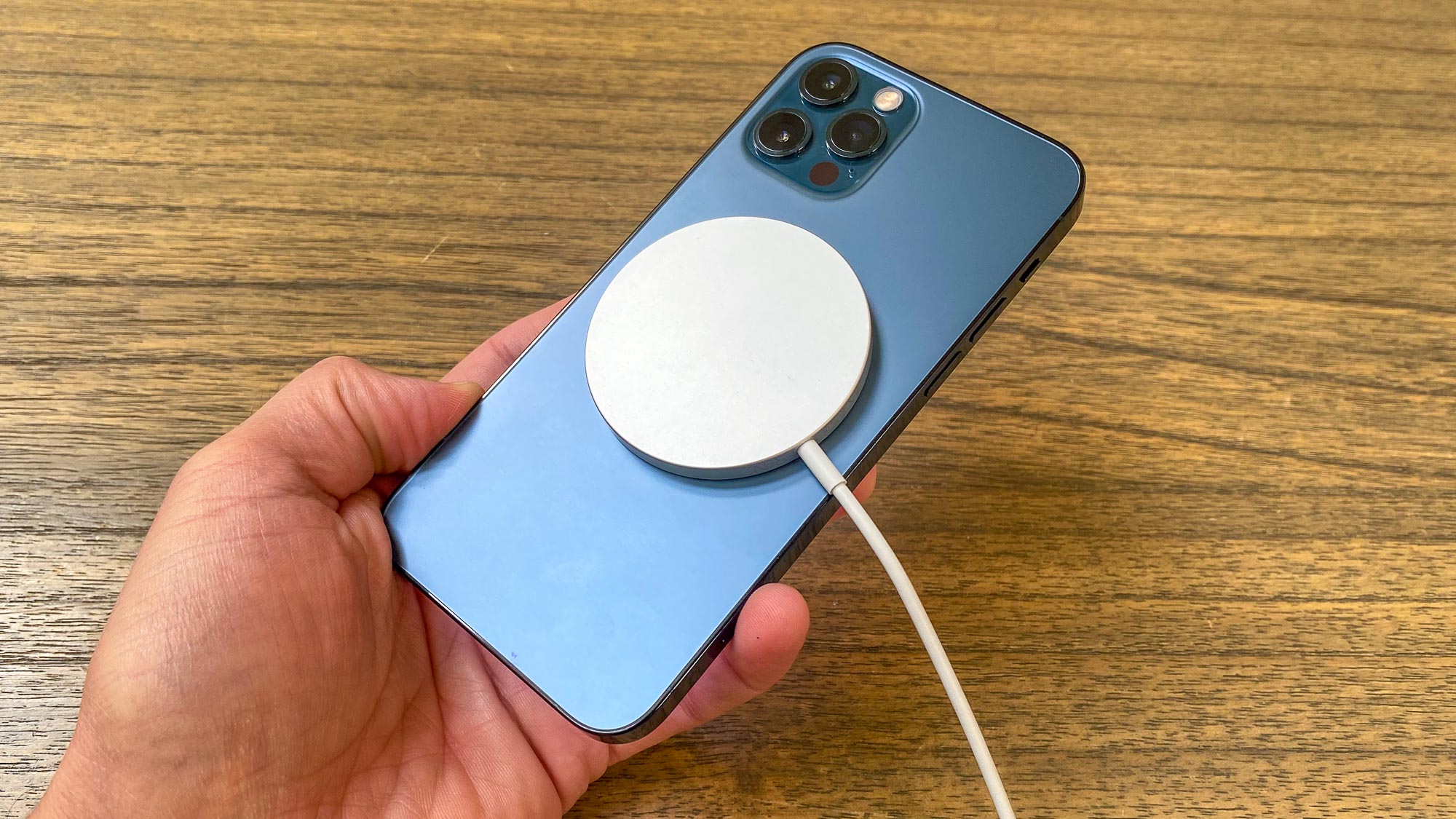
5G takes a pretty big toll on batteries. The iPhone 12 is the first series of iPhones from Apple to use the new technology, so some growing pains are inevitable. Because of this, the iPhone 12 Pro didn’t last as long as you might expect given how well its LTE-only predecessor did. That’s not the say the phone dies quickly, but its 2,815 mAh battery drains noticeably faster than the Galaxy S21 Plus’ 4,800 mAh power pack.
Our battery test is the same for all phones we review. Each device has its display set to 150 nits and then reloads webpages every 30 seconds on a cellular connection (5G in this case) until it dies. The Galaxy S21 Plus underwent two tests, one for its adaptive refresh rate and the other for the 60Hz mode.
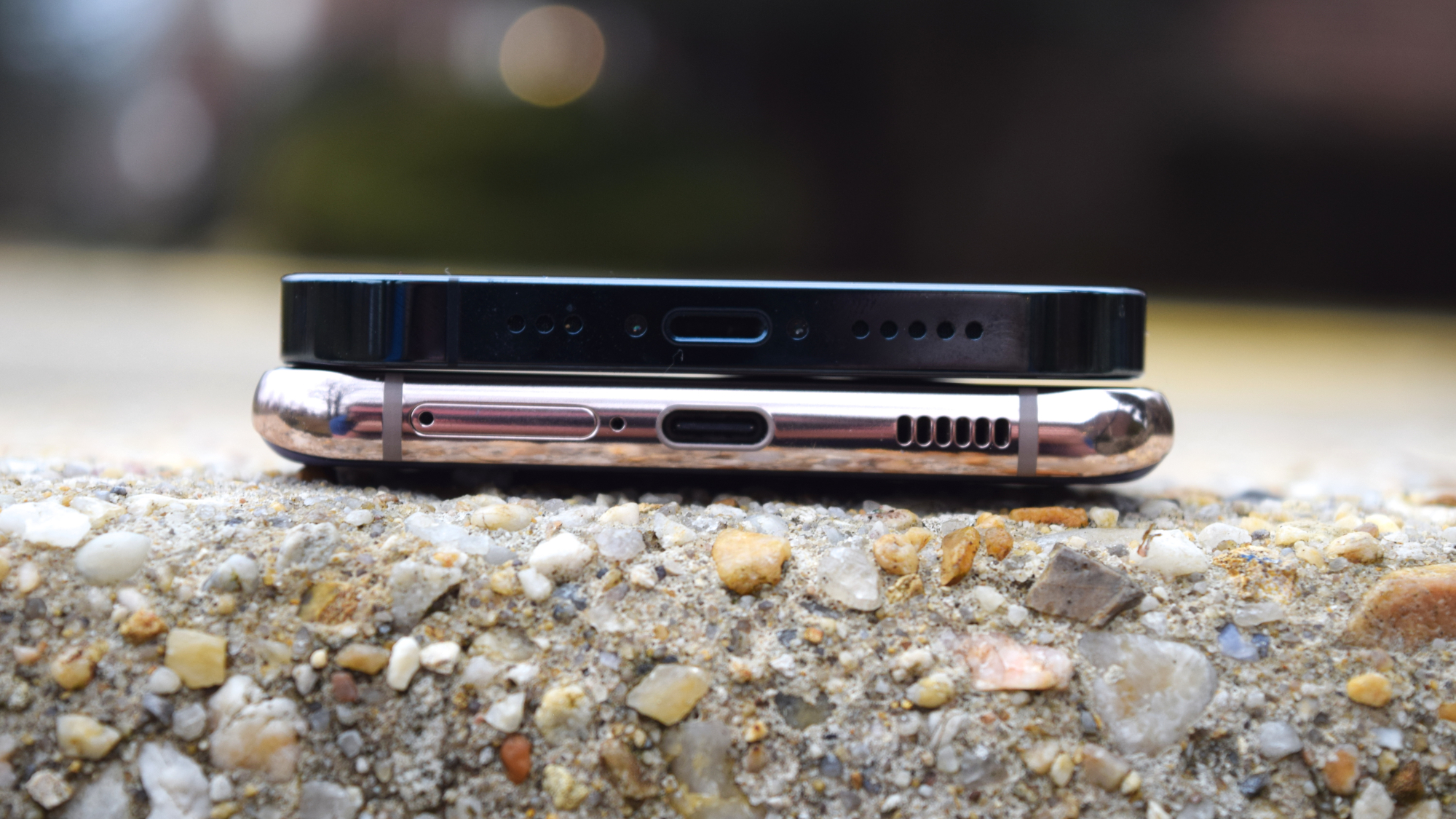
The Galaxy S21 Plus lasted 9 hours and 41 minutes on adaptive (which is the default mode out of the box) and 9 hours and 53 minutes on 60Hz. The iPhone 12 Pro managed 9 hours and 6 minutes. Both phones are very close here, but the S21 Plus ekes out a victory.
For charging, neither phones includes a charging brick in the box. This is meant to save on e-waste and to cut down on costs. You do still get a USB cable and you can purchase a charging brick separately. The Galaxy S21 Plus supports up to 25W fast charging, while the iPhone 12 Pro supports up to 20W. You can use wireless chargers for either phone, including the new MagSafe charger for the iPhone 12 Pro.
Winner: Galaxy S21 Plus
Samsung Galaxy S21 Plus vs. iPhone 12 Pro: Software and special features
Software is how both phones stand apart from each other. The Galaxy S21 Plus uses Android, specifically its One UI 3 skin atop Android 11. The iPhone 12 Pro uses Apple’s iOS 14. These mobile operating systems do things very differently from each other, and they appeal to different people.
Samsung recently announced a new policy for device support, saying that it will support some of its devices for three major Android updates. That’s good news and a huge improvement over the Samsung of old. The updates will still lag behind Google’s official Android releases by several months in most cases, but at least they’re bound to arrive at some point.
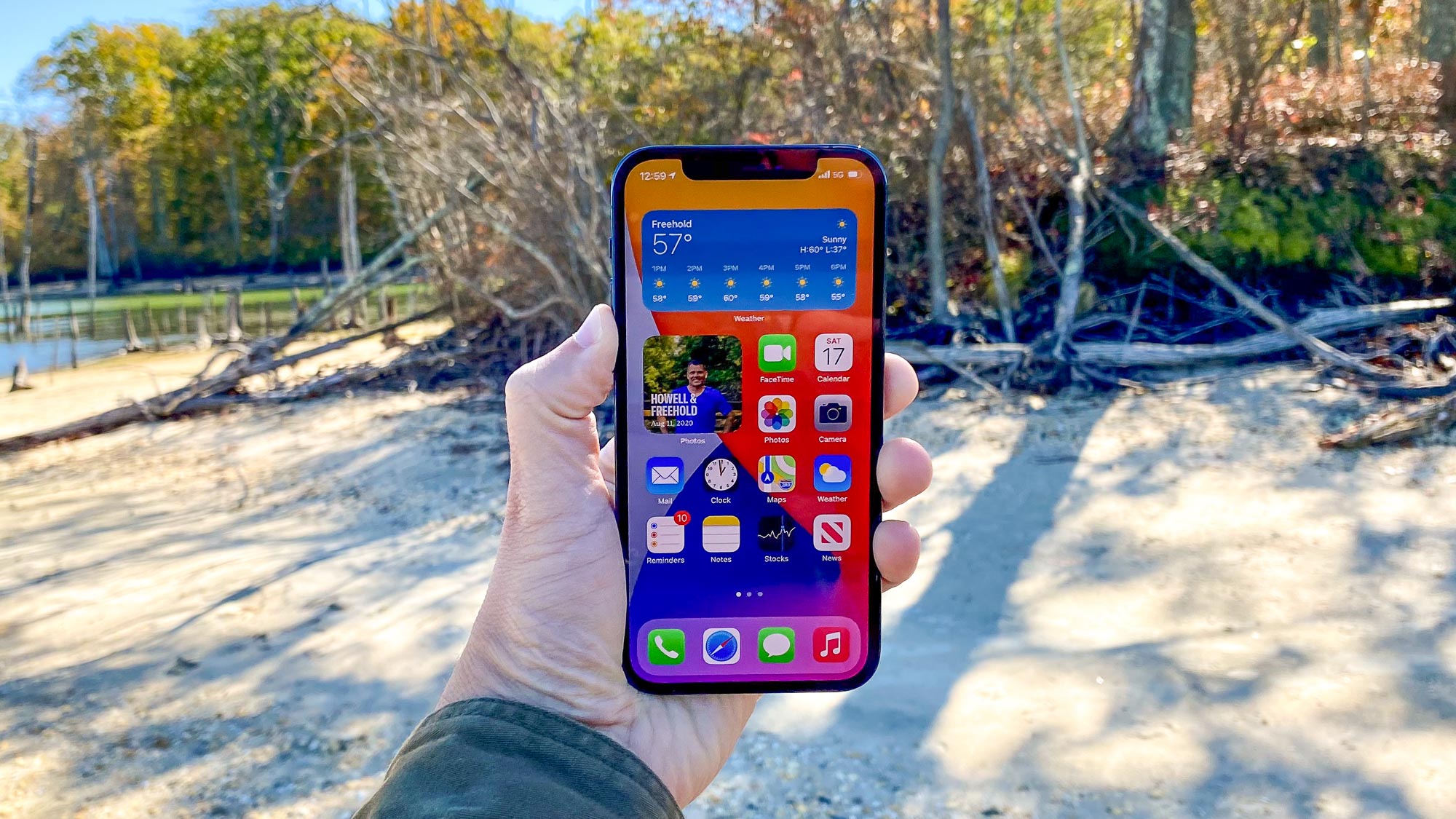
The iPhone 12 Pro doesn’t have this problem. It gets updates the same day as any other supported iPhone. When Apple puts out a new iOS version, like iOS 15, the iPhone 12 Pro will get it that same day. It’s a model that some Android users envy, in addition to how long Apple supports its phones.
The Galaxy S21 Plus runs the latest version of Android, Android 11. With this phone, Samsung introduced One UI 3.1, which brought a lot of new features. Things like Google Discover integrated into the home screen, Google Duo built into the stock phone app, and a whole lot more, it was a big update that’s trickling down to other Galaxy devices. Samsung likes to throw a lot of software features at its phones, and some stick around.
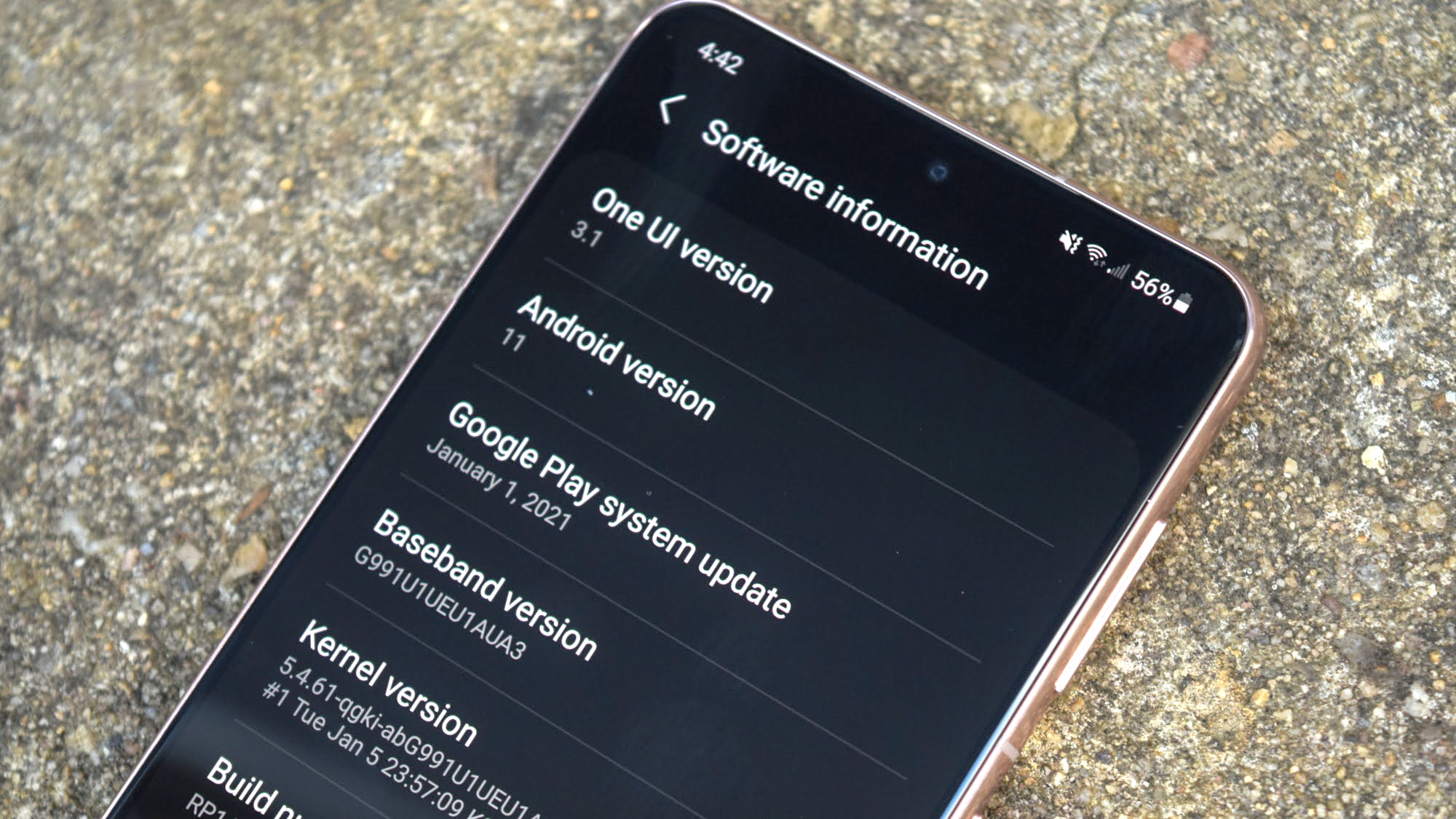
We’ve already talked about iOS 14, but it changed a lot of things about how you use iOS. It added widgets to the home screen, an App Library for all of your apps (akin to Android’s long-standing app drawer), and the ability to set your own default web browser and email client. The latest iOS 14.5 will let you choose your own default music streaming app, too, among other things.
While one is not better than the other, the iPhone 12 Pro just barely wins here due to how fast it receives updates. Samsung doesn’t keep up with Google’s releases,
Winner: iPhone 12 Pro
Samsung Galaxy S21 Plus vs. iPhone 12 Pro: Overall winner
| Row 0 - Cell 0 | Galaxy S21 Plus | iPhone 12 Pro |
| Price (10 points) | 8 | 8 |
| Design (10 points) | 8 | 9 |
| Display (15 points) | 15 | 14 |
| Cameras (20 points) | 18 | 19 |
| Performance (15 points) | 11 | 15 |
| 5G (5 points) | 3 | 3 |
| Battery and charging (15 points) | 12 | 10 |
| Software and special features (10 points) | 9 | 10 |
| Overall (100 points) | 84 | 88 |
This is a close race, but the iPhone 12 Pro ultimately comes out ahead. Though the Galaxy S21 Plus put up a very good fight, the iPhone manages a victory in this face-off because of its better performance and especially its better cameras.
The Galaxy S21 Plus has a bigger display with faster refresh rate and longer battery life, so if those are more important to you, then Samsung is the way to go here. At $999, you're getting a lot for your money.
Ultimately, you'll need to ask yourself whether you prefer Android or iOS. That's going to be the deciding factor for you, unless you're platform-agnostic. Otherwise, you'll want to decide whether you want a big or smaller screen.
Sign up to get the BEST of Tom's Guide direct to your inbox.
Get instant access to breaking news, the hottest reviews, great deals and helpful tips.

Jordan is the Phones Editor for Tom's Guide, covering all things phone-related. He's written about phones for over six years and plans to continue for a long while to come. He loves nothing more than relaxing in his home with a book, game, or his latest personal writing project. Jordan likes finding new things to dive into, from books and games to new mechanical keyboard switches and fun keycap sets. Outside of work, you can find him poring over open-source software and his studies.
-
Lordofirritation I am sorry but both phones are exactly equal, I realize that this is a opinion piece from a fan of Apple products but lets be real, Samsung won the phone wars when Apple had to start buying screens from them in order to even stay halfway competitive. So in reality Samsung wins no matter which of these phones you choose.Reply
